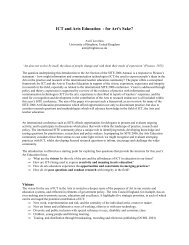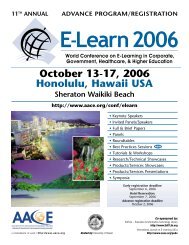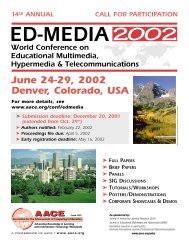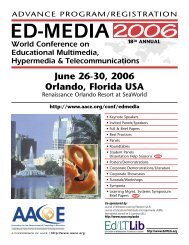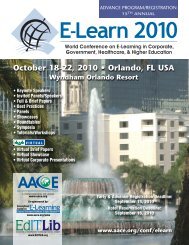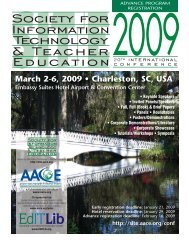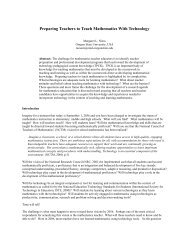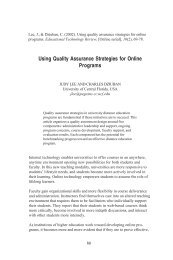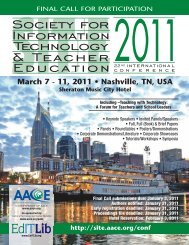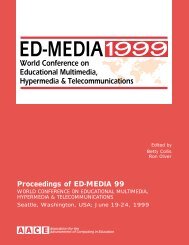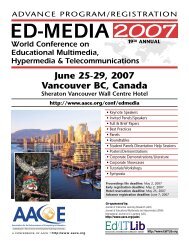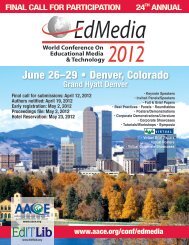ED-MEDIA 1999 Proceedings Book - Association for the ...
ED-MEDIA 1999 Proceedings Book - Association for the ...
ED-MEDIA 1999 Proceedings Book - Association for the ...
You also want an ePaper? Increase the reach of your titles
YUMPU automatically turns print PDFs into web optimized ePapers that Google loves.
ownership is retained by <strong>the</strong> institution that developed <strong>the</strong> original material. The<br />
NTLD is a distributed database (at many locations) which academics can search and<br />
obtain teaching and learning materials to be customised, assembled and utilised as<br />
appropriate to <strong>the</strong> individual or institution style.<br />
Key benefits of <strong>the</strong> NTLD are a “one-stop” shop <strong>for</strong> teaching and learning resources<br />
that can be deployed or re-deployed using different educational methodologies, e.g.,<br />
resource-based, problem-based, or constructivist models.<br />
The aim of this paper is to seek to understand and describe <strong>the</strong> academic culture in<br />
order to be able to develop computer-mediated courseware that will be utilised by <strong>the</strong><br />
individuals working within this culture.<br />
1. INTRODUCTION<br />
The academic culture has a range of attributes that lie between several continua of<br />
extremes. Collegiality at one end, and individuality at <strong>the</strong> o<strong>the</strong>r, describe one such<br />
continuum. The system rewards <strong>the</strong> behaviour that characterises both ends of this<br />
continuum, <strong>for</strong> example, collaboration in research is rewarded as is <strong>the</strong> demonstration<br />
of individual creativity. Individual per<strong>for</strong>mance is particularly prised and sought after<br />
and is accompanied by such questions as “but how much of it was really his/her own<br />
work” This individualistic end of <strong>the</strong> continuum can lead to idiosyncrasy as<br />
academics seek to distinguish <strong>the</strong>mselves from <strong>the</strong>ir colleagues. This idiosyncrasy can<br />
also pervade course development to <strong>the</strong> extent that individual teachers make courses<br />
unique to <strong>the</strong>mselves. In fact, it is probably true to say that no two individuals will<br />
teach <strong>the</strong> “same” course in <strong>the</strong> same way. Each individual will seek to personalise <strong>the</strong><br />
course in keeping with his/her own experience, beliefs and values. This also applies to<br />
computer mediated courseware development.<br />
If individual academics can be labelled as idiosyncratic, institutions also attempt to<br />
distinguish <strong>the</strong>mselves from each o<strong>the</strong>r. Thus, part of <strong>the</strong> academic culture can be<br />
characterised by individuality or idiosyncrasy at more than one level, including<br />
departments and faculties which seek to distinguish <strong>the</strong>mselves.<br />
Ano<strong>the</strong>r continuum may be described by <strong>the</strong> extremes of conservatism and<br />
innovation. From <strong>the</strong> teaching point of view, <strong>the</strong> conservative extreme of <strong>the</strong><br />
continuum may be concerned with maintaining <strong>the</strong> face-to-face didactic environment<br />
and one of many innovation extremes may be concerned with computer-based, online,<br />
distributed teaching and learning environments. It is probably reasonable to say<br />
that parts of both extremes are relevant and appropriate at certain times <strong>for</strong> certain<br />
purposes. Computer mediated courseware development belongs mainly at <strong>the</strong><br />
innovation end of this particular continuum. The conservative extreme tends to resist<br />
technological innovation (Hesketh et al., 1996; Craw<strong>for</strong>d and Craw<strong>for</strong>d, 1997).<br />
2. COMPUTER M<strong>ED</strong>IAT<strong>ED</strong> COURSEWARE<br />
Computer mediated courseware (CMC) has probably as many meanings and<br />
applications as <strong>the</strong>re are people thinking about it. Broadly, CMC has enabled a kind of



